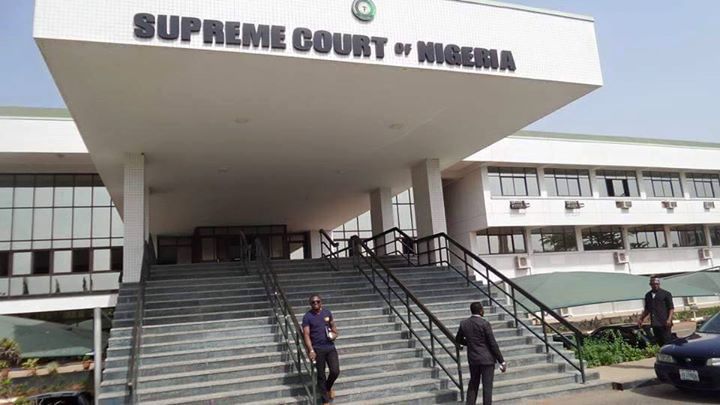Lawyers are seeking clarity on suggestions by the National Summit on Justice to limit the jurisdiction of the Supreme Court to only presidential and governorship petitions appeals.
The Chairman of the Joint Planning Committee of the National Summit on Justice, Dr Babatunde Babajide (SAN) announced the resolution during a press briefing in Abuja on Friday.
He said most of these proposals were accepted by the panelists present and by the audience as being worthy of adoption.
He said, “Appeals would only be by the leave of the Supreme Court, and that the automatic right of appeal to the Supreme Court will be severely curtailed and will be limited only to matters relating to the office and the election into the office of the president of the federation, vice president and, and governors of the states.”
- Man accused of supplying firearms to bandits arraigned in Kano
- Access Holdings, partners move to empower women with disabilities
He said the session also dealt at length with the challenges with discipline at the bar and on the bench, and the fact that problems of indiscipline were significant contributors to the current inefficiency of the justice sector, and also to the lack of confidence that the populace have or seem to have now, in the justice sector in Nigeria.
“Various proposals were put forward to enhance the level of discipline at the bar, not least of which was the need for there to be clarity as to who has the authority to discipline legal practitioners and also issues as to how to improve the efficiency of the disciplinary process for legal practitioners,” he said.
“Similar concerns were expressed about discipline and monitoring of the performance of judicial officers. And it was agreed that significant steps needed to be taken in these areas to enhance the quality of justice delivery in Nigeria and increase the confidence of members of the public in our justice sector,” he added.
However, some lawyers reason that the proposal limiting the jurisdiction of the Supreme Court is unworkable for several reasons.
Chuka Obidike Esq said there needs to be clarity on how the proposal would work because Nigeria’s system was inherited from the British system.
“Election is a four-year cycle, are the Supreme Court justices who constitute some of the most experienced judicial officers in the land, going to be redundant till elections?” he asked.
“The conversation should be how to restore confidence in the electoral process to make the losers easily congratulate the winner.
“My view firmly remains that the Supreme Court should remain what it is.
“As a lawyer, I believe some cases should not go to the Supreme Court but I didn’t agree that it should become strictly for election matters.”
Also reacting, Hameed Ajibola Jimoh Esq said “Whether it is a good step or not, I am of the view that a try of the recommendation would clarify if that is the right path or not.
“Nevertheless, I am of the firm view that limiting the jurisdiction of the Supreme Court to only presidential and governorship election petition appeals is not the main solution to delayed justice rather, employment of more and enough judges and justices to handle the numerous cases at both the trial courts and the appellate courts would reduce (if not eradicate) such delayed justice.”
He said the proposal is like deliberately avoiding the challenges of the judiciary, which includes the emoluments and welfare of these judges.
Similarly, E.M.D. Umukoro Esq said the proposal to make the Supreme Court strictly for presidential and governorship petitions interpretations is not the most pressing need of the judiciary.
“The most important thing is to ensure that those who are being appointed unto the bench are forthright; those who are jurists par excellence, in other words, we have those who have been elevated from the lower courts through hardwork and excellence,” he said.
“We should strengthen the structures to work well.
“I would rather suggest that instead of limiting the Supreme Court to just the presidential and governorship appeals, the governorship appeals should end at the Court of Appeal.
“The most important thing is to have forthright justices who would not compromise because a good decision of the court is a good decision irrespective.
“A two-step system is enough for us if we know what we are doing.
“If the justices are not forthright and they don’t dispense justice, if you limit it to only one, injustice in one case is injustice in all cases.”
Stephen Okangla, in his article, explained that the original and appellate jurisdiction of the Supreme Court has been circumscribed in sections 232 and 233 of the Constitution of the Federal Republic of Nigeria 1999 as amended, 2011.
He added, “Jurisdiction of a Court is very important in any proceeding without it, the court will not be well suited to adjudicate. It is intrinsic to the whole adjudicatory process and cannot be overemphasised. Jurisdiction is what qualifies a court to entertain a case, it is the livewire, root and blood in every adjudication. It is conferred on the court by the Constitution and statutes establishing it, it cannot be implied, donated by parties in a matter and/or limited or expanded by the court.”

 Join Daily Trust WhatsApp Community For Quick Access To News and Happenings Around You.
Join Daily Trust WhatsApp Community For Quick Access To News and Happenings Around You.


